Organisational Behaviour Report: BBC Motivational Theories Analysis
VerifiedAdded on 2020/07/22
|16
|4904
|37
Report
AI Summary
This report provides an in-depth analysis of organisational behaviour within the British Broadcasting Corporation (BBC). It begins by introducing the concept of organisational behaviour and its significance in enhancing workplace culture and efficiency. The report then delves into Task 1, exploring Handy's Cultural Typology, which categorizes organizational cultures based on power, task, person, and role. It examines how these cultural types manifest within BBC and how culture, power, and politics influence individual and team behaviour. Task 2 focuses on motivational theories, including Maslow's hierarchy of needs and Herzberg's two-factor theory, and assesses how these theories can be applied to improve team effectiveness within the BBC. Task 3 investigates different types of teams in the context of BBC, including Tuckman's model for team development. Finally, Task 4 addresses methods for improving team performance and productivity, as well as barriers to effective performance within the organization. The report concludes with a summary of the key findings and recommendations for enhancing organisational capabilities and managerial decision-making within BBC.
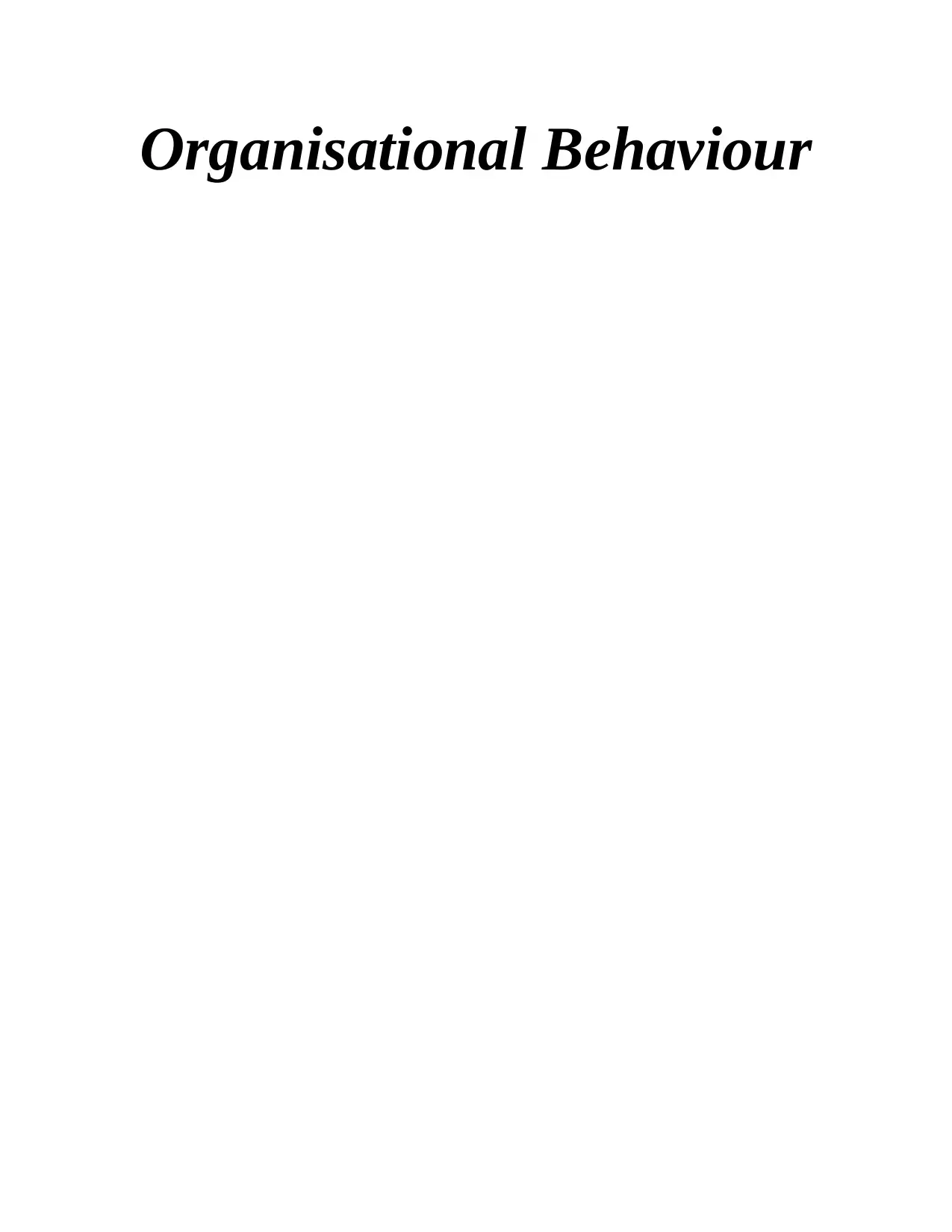
Organisational Behaviour
Paraphrase This Document
Need a fresh take? Get an instant paraphrase of this document with our AI Paraphraser
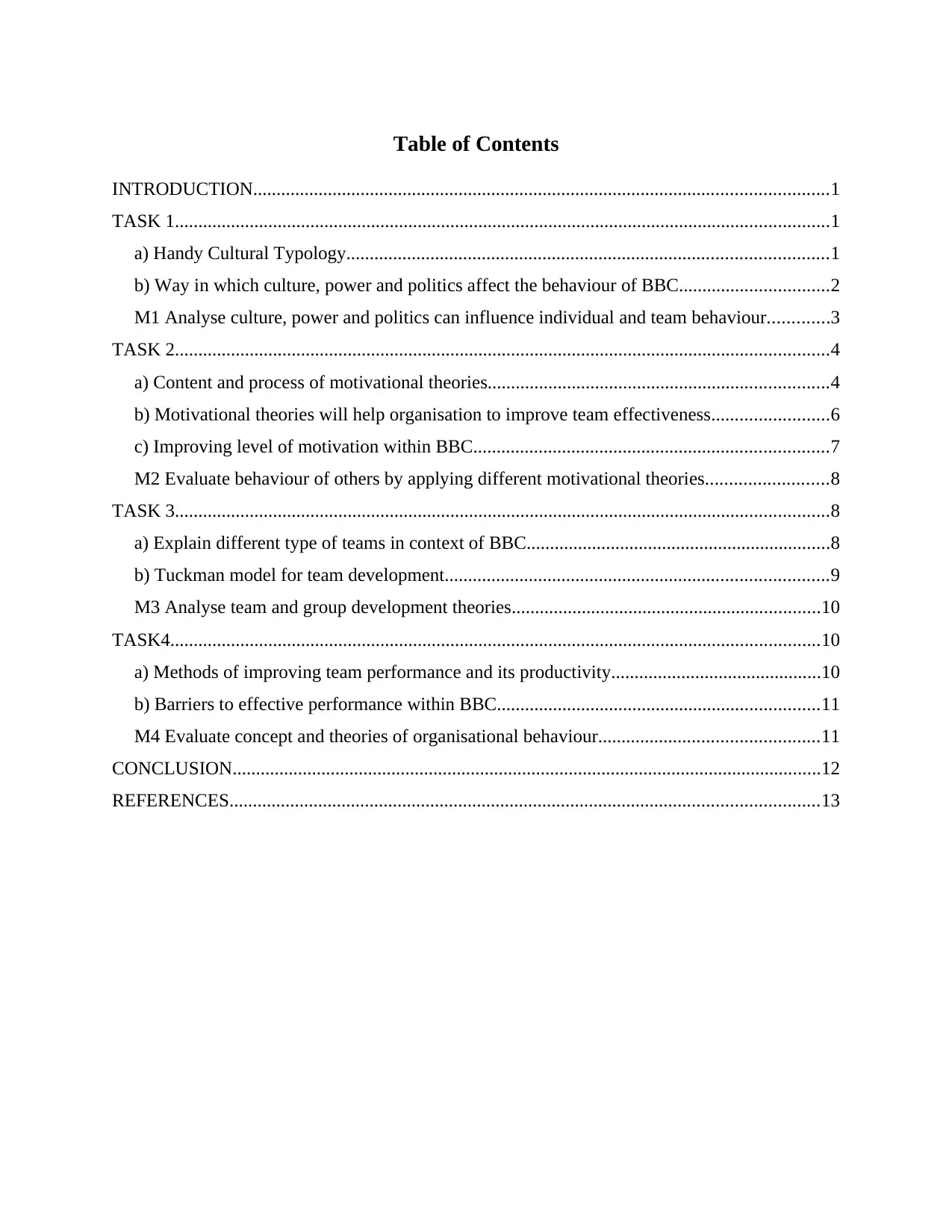
Table of Contents
INTRODUCTION...........................................................................................................................1
TASK 1............................................................................................................................................1
a) Handy Cultural Typology.......................................................................................................1
b) Way in which culture, power and politics affect the behaviour of BBC................................2
M1 Analyse culture, power and politics can influence individual and team behaviour.............3
TASK 2............................................................................................................................................4
a) Content and process of motivational theories.........................................................................4
b) Motivational theories will help organisation to improve team effectiveness.........................6
c) Improving level of motivation within BBC............................................................................7
M2 Evaluate behaviour of others by applying different motivational theories..........................8
TASK 3............................................................................................................................................8
a) Explain different type of teams in context of BBC.................................................................8
b) Tuckman model for team development..................................................................................9
M3 Analyse team and group development theories..................................................................10
TASK4...........................................................................................................................................10
a) Methods of improving team performance and its productivity.............................................10
b) Barriers to effective performance within BBC.....................................................................11
M4 Evaluate concept and theories of organisational behaviour...............................................11
CONCLUSION..............................................................................................................................12
REFERENCES..............................................................................................................................13
INTRODUCTION...........................................................................................................................1
TASK 1............................................................................................................................................1
a) Handy Cultural Typology.......................................................................................................1
b) Way in which culture, power and politics affect the behaviour of BBC................................2
M1 Analyse culture, power and politics can influence individual and team behaviour.............3
TASK 2............................................................................................................................................4
a) Content and process of motivational theories.........................................................................4
b) Motivational theories will help organisation to improve team effectiveness.........................6
c) Improving level of motivation within BBC............................................................................7
M2 Evaluate behaviour of others by applying different motivational theories..........................8
TASK 3............................................................................................................................................8
a) Explain different type of teams in context of BBC.................................................................8
b) Tuckman model for team development..................................................................................9
M3 Analyse team and group development theories..................................................................10
TASK4...........................................................................................................................................10
a) Methods of improving team performance and its productivity.............................................10
b) Barriers to effective performance within BBC.....................................................................11
M4 Evaluate concept and theories of organisational behaviour...............................................11
CONCLUSION..............................................................................................................................12
REFERENCES..............................................................................................................................13
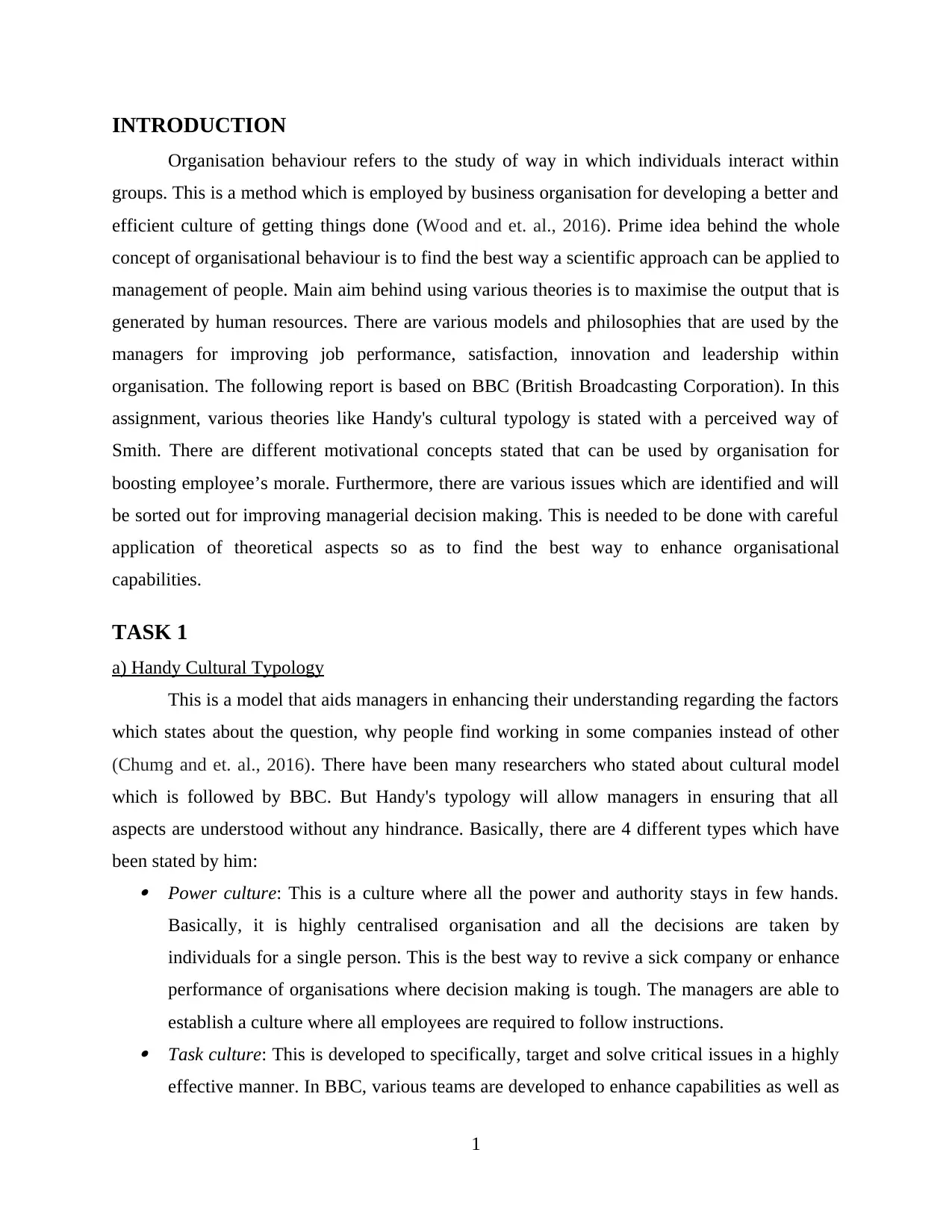
INTRODUCTION
Organisation behaviour refers to the study of way in which individuals interact within
groups. This is a method which is employed by business organisation for developing a better and
efficient culture of getting things done (Wood and et. al., 2016). Prime idea behind the whole
concept of organisational behaviour is to find the best way a scientific approach can be applied to
management of people. Main aim behind using various theories is to maximise the output that is
generated by human resources. There are various models and philosophies that are used by the
managers for improving job performance, satisfaction, innovation and leadership within
organisation. The following report is based on BBC (British Broadcasting Corporation). In this
assignment, various theories like Handy's cultural typology is stated with a perceived way of
Smith. There are different motivational concepts stated that can be used by organisation for
boosting employee’s morale. Furthermore, there are various issues which are identified and will
be sorted out for improving managerial decision making. This is needed to be done with careful
application of theoretical aspects so as to find the best way to enhance organisational
capabilities.
TASK 1
a) Handy Cultural Typology
This is a model that aids managers in enhancing their understanding regarding the factors
which states about the question, why people find working in some companies instead of other
(Chumg and et. al., 2016). There have been many researchers who stated about cultural model
which is followed by BBC. But Handy's typology will allow managers in ensuring that all
aspects are understood without any hindrance. Basically, there are 4 different types which have
been stated by him: Power culture: This is a culture where all the power and authority stays in few hands.
Basically, it is highly centralised organisation and all the decisions are taken by
individuals for a single person. This is the best way to revive a sick company or enhance
performance of organisations where decision making is tough. The managers are able to
establish a culture where all employees are required to follow instructions. Task culture: This is developed to specifically, target and solve critical issues in a highly
effective manner. In BBC, various teams are developed to enhance capabilities as well as
1
Organisation behaviour refers to the study of way in which individuals interact within
groups. This is a method which is employed by business organisation for developing a better and
efficient culture of getting things done (Wood and et. al., 2016). Prime idea behind the whole
concept of organisational behaviour is to find the best way a scientific approach can be applied to
management of people. Main aim behind using various theories is to maximise the output that is
generated by human resources. There are various models and philosophies that are used by the
managers for improving job performance, satisfaction, innovation and leadership within
organisation. The following report is based on BBC (British Broadcasting Corporation). In this
assignment, various theories like Handy's cultural typology is stated with a perceived way of
Smith. There are different motivational concepts stated that can be used by organisation for
boosting employee’s morale. Furthermore, there are various issues which are identified and will
be sorted out for improving managerial decision making. This is needed to be done with careful
application of theoretical aspects so as to find the best way to enhance organisational
capabilities.
TASK 1
a) Handy Cultural Typology
This is a model that aids managers in enhancing their understanding regarding the factors
which states about the question, why people find working in some companies instead of other
(Chumg and et. al., 2016). There have been many researchers who stated about cultural model
which is followed by BBC. But Handy's typology will allow managers in ensuring that all
aspects are understood without any hindrance. Basically, there are 4 different types which have
been stated by him: Power culture: This is a culture where all the power and authority stays in few hands.
Basically, it is highly centralised organisation and all the decisions are taken by
individuals for a single person. This is the best way to revive a sick company or enhance
performance of organisations where decision making is tough. The managers are able to
establish a culture where all employees are required to follow instructions. Task culture: This is developed to specifically, target and solve critical issues in a highly
effective manner. In BBC, various teams are developed to enhance capabilities as well as
1
⊘ This is a preview!⊘
Do you want full access?
Subscribe today to unlock all pages.

Trusted by 1+ million students worldwide
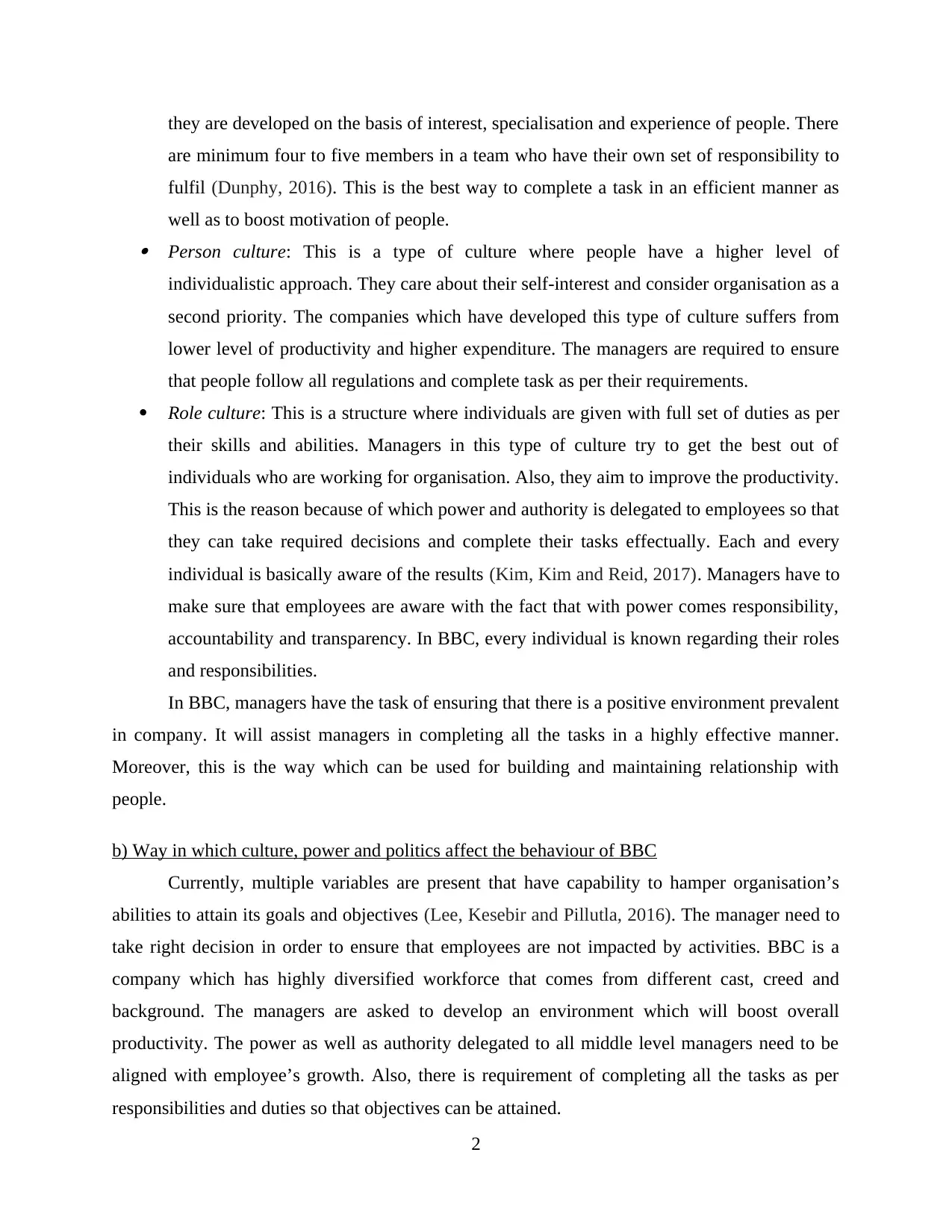
they are developed on the basis of interest, specialisation and experience of people. There
are minimum four to five members in a team who have their own set of responsibility to
fulfil (Dunphy, 2016). This is the best way to complete a task in an efficient manner as
well as to boost motivation of people. Person culture: This is a type of culture where people have a higher level of
individualistic approach. They care about their self-interest and consider organisation as a
second priority. The companies which have developed this type of culture suffers from
lower level of productivity and higher expenditure. The managers are required to ensure
that people follow all regulations and complete task as per their requirements.
Role culture: This is a structure where individuals are given with full set of duties as per
their skills and abilities. Managers in this type of culture try to get the best out of
individuals who are working for organisation. Also, they aim to improve the productivity.
This is the reason because of which power and authority is delegated to employees so that
they can take required decisions and complete their tasks effectually. Each and every
individual is basically aware of the results (Kim, Kim and Reid, 2017). Managers have to
make sure that employees are aware with the fact that with power comes responsibility,
accountability and transparency. In BBC, every individual is known regarding their roles
and responsibilities.
In BBC, managers have the task of ensuring that there is a positive environment prevalent
in company. It will assist managers in completing all the tasks in a highly effective manner.
Moreover, this is the way which can be used for building and maintaining relationship with
people.
b) Way in which culture, power and politics affect the behaviour of BBC
Currently, multiple variables are present that have capability to hamper organisation’s
abilities to attain its goals and objectives (Lee, Kesebir and Pillutla, 2016). The manager need to
take right decision in order to ensure that employees are not impacted by activities. BBC is a
company which has highly diversified workforce that comes from different cast, creed and
background. The managers are asked to develop an environment which will boost overall
productivity. The power as well as authority delegated to all middle level managers need to be
aligned with employee’s growth. Also, there is requirement of completing all the tasks as per
responsibilities and duties so that objectives can be attained.
2
are minimum four to five members in a team who have their own set of responsibility to
fulfil (Dunphy, 2016). This is the best way to complete a task in an efficient manner as
well as to boost motivation of people. Person culture: This is a type of culture where people have a higher level of
individualistic approach. They care about their self-interest and consider organisation as a
second priority. The companies which have developed this type of culture suffers from
lower level of productivity and higher expenditure. The managers are required to ensure
that people follow all regulations and complete task as per their requirements.
Role culture: This is a structure where individuals are given with full set of duties as per
their skills and abilities. Managers in this type of culture try to get the best out of
individuals who are working for organisation. Also, they aim to improve the productivity.
This is the reason because of which power and authority is delegated to employees so that
they can take required decisions and complete their tasks effectually. Each and every
individual is basically aware of the results (Kim, Kim and Reid, 2017). Managers have to
make sure that employees are aware with the fact that with power comes responsibility,
accountability and transparency. In BBC, every individual is known regarding their roles
and responsibilities.
In BBC, managers have the task of ensuring that there is a positive environment prevalent
in company. It will assist managers in completing all the tasks in a highly effective manner.
Moreover, this is the way which can be used for building and maintaining relationship with
people.
b) Way in which culture, power and politics affect the behaviour of BBC
Currently, multiple variables are present that have capability to hamper organisation’s
abilities to attain its goals and objectives (Lee, Kesebir and Pillutla, 2016). The manager need to
take right decision in order to ensure that employees are not impacted by activities. BBC is a
company which has highly diversified workforce that comes from different cast, creed and
background. The managers are asked to develop an environment which will boost overall
productivity. The power as well as authority delegated to all middle level managers need to be
aligned with employee’s growth. Also, there is requirement of completing all the tasks as per
responsibilities and duties so that objectives can be attained.
2
Paraphrase This Document
Need a fresh take? Get an instant paraphrase of this document with our AI Paraphraser
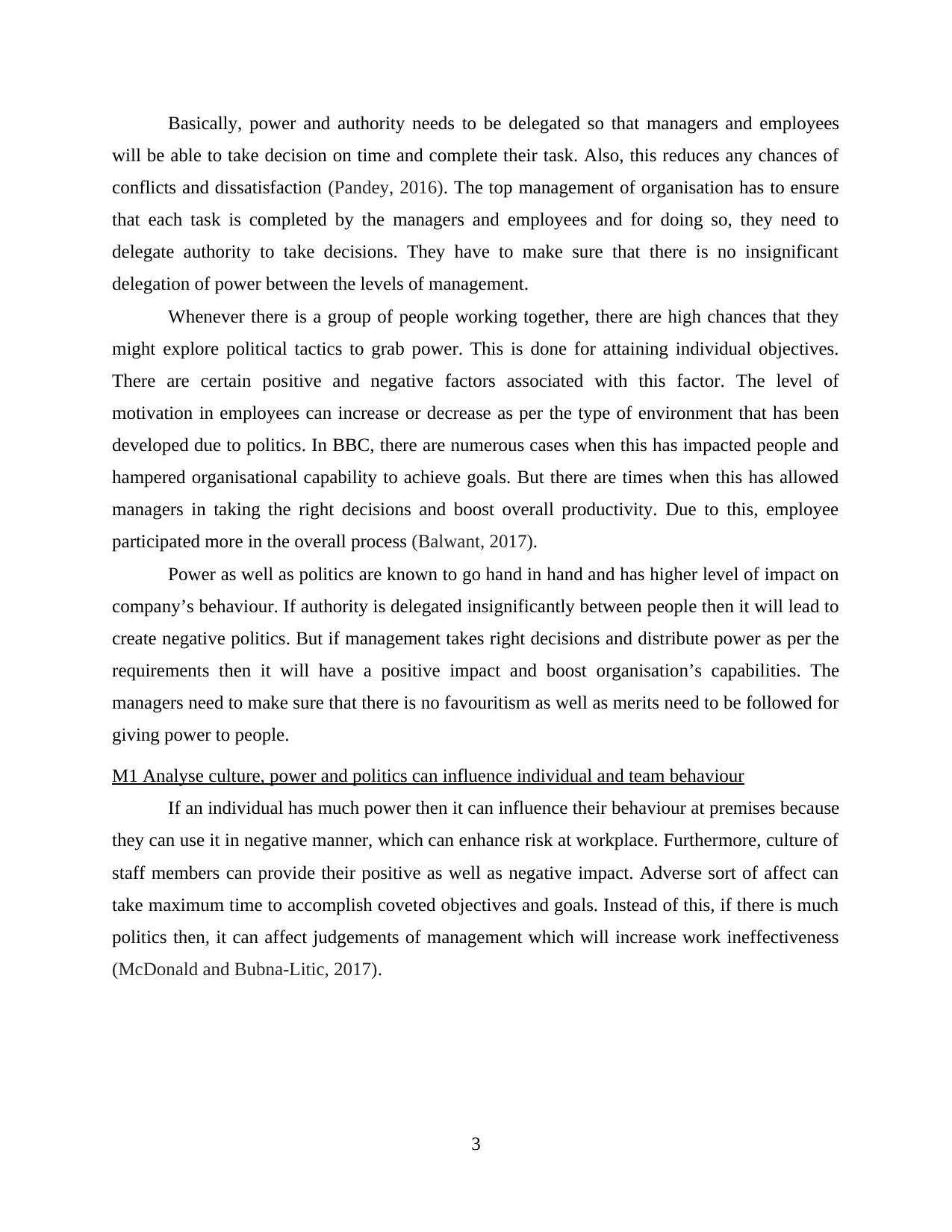
Basically, power and authority needs to be delegated so that managers and employees
will be able to take decision on time and complete their task. Also, this reduces any chances of
conflicts and dissatisfaction (Pandey, 2016). The top management of organisation has to ensure
that each task is completed by the managers and employees and for doing so, they need to
delegate authority to take decisions. They have to make sure that there is no insignificant
delegation of power between the levels of management.
Whenever there is a group of people working together, there are high chances that they
might explore political tactics to grab power. This is done for attaining individual objectives.
There are certain positive and negative factors associated with this factor. The level of
motivation in employees can increase or decrease as per the type of environment that has been
developed due to politics. In BBC, there are numerous cases when this has impacted people and
hampered organisational capability to achieve goals. But there are times when this has allowed
managers in taking the right decisions and boost overall productivity. Due to this, employee
participated more in the overall process (Balwant, 2017).
Power as well as politics are known to go hand in hand and has higher level of impact on
company’s behaviour. If authority is delegated insignificantly between people then it will lead to
create negative politics. But if management takes right decisions and distribute power as per the
requirements then it will have a positive impact and boost organisation’s capabilities. The
managers need to make sure that there is no favouritism as well as merits need to be followed for
giving power to people.
M1 Analyse culture, power and politics can influence individual and team behaviour
If an individual has much power then it can influence their behaviour at premises because
they can use it in negative manner, which can enhance risk at workplace. Furthermore, culture of
staff members can provide their positive as well as negative impact. Adverse sort of affect can
take maximum time to accomplish coveted objectives and goals. Instead of this, if there is much
politics then, it can affect judgements of management which will increase work ineffectiveness
(McDonald and Bubna-Litic, 2017).
3
will be able to take decision on time and complete their task. Also, this reduces any chances of
conflicts and dissatisfaction (Pandey, 2016). The top management of organisation has to ensure
that each task is completed by the managers and employees and for doing so, they need to
delegate authority to take decisions. They have to make sure that there is no insignificant
delegation of power between the levels of management.
Whenever there is a group of people working together, there are high chances that they
might explore political tactics to grab power. This is done for attaining individual objectives.
There are certain positive and negative factors associated with this factor. The level of
motivation in employees can increase or decrease as per the type of environment that has been
developed due to politics. In BBC, there are numerous cases when this has impacted people and
hampered organisational capability to achieve goals. But there are times when this has allowed
managers in taking the right decisions and boost overall productivity. Due to this, employee
participated more in the overall process (Balwant, 2017).
Power as well as politics are known to go hand in hand and has higher level of impact on
company’s behaviour. If authority is delegated insignificantly between people then it will lead to
create negative politics. But if management takes right decisions and distribute power as per the
requirements then it will have a positive impact and boost organisation’s capabilities. The
managers need to make sure that there is no favouritism as well as merits need to be followed for
giving power to people.
M1 Analyse culture, power and politics can influence individual and team behaviour
If an individual has much power then it can influence their behaviour at premises because
they can use it in negative manner, which can enhance risk at workplace. Furthermore, culture of
staff members can provide their positive as well as negative impact. Adverse sort of affect can
take maximum time to accomplish coveted objectives and goals. Instead of this, if there is much
politics then, it can affect judgements of management which will increase work ineffectiveness
(McDonald and Bubna-Litic, 2017).
3
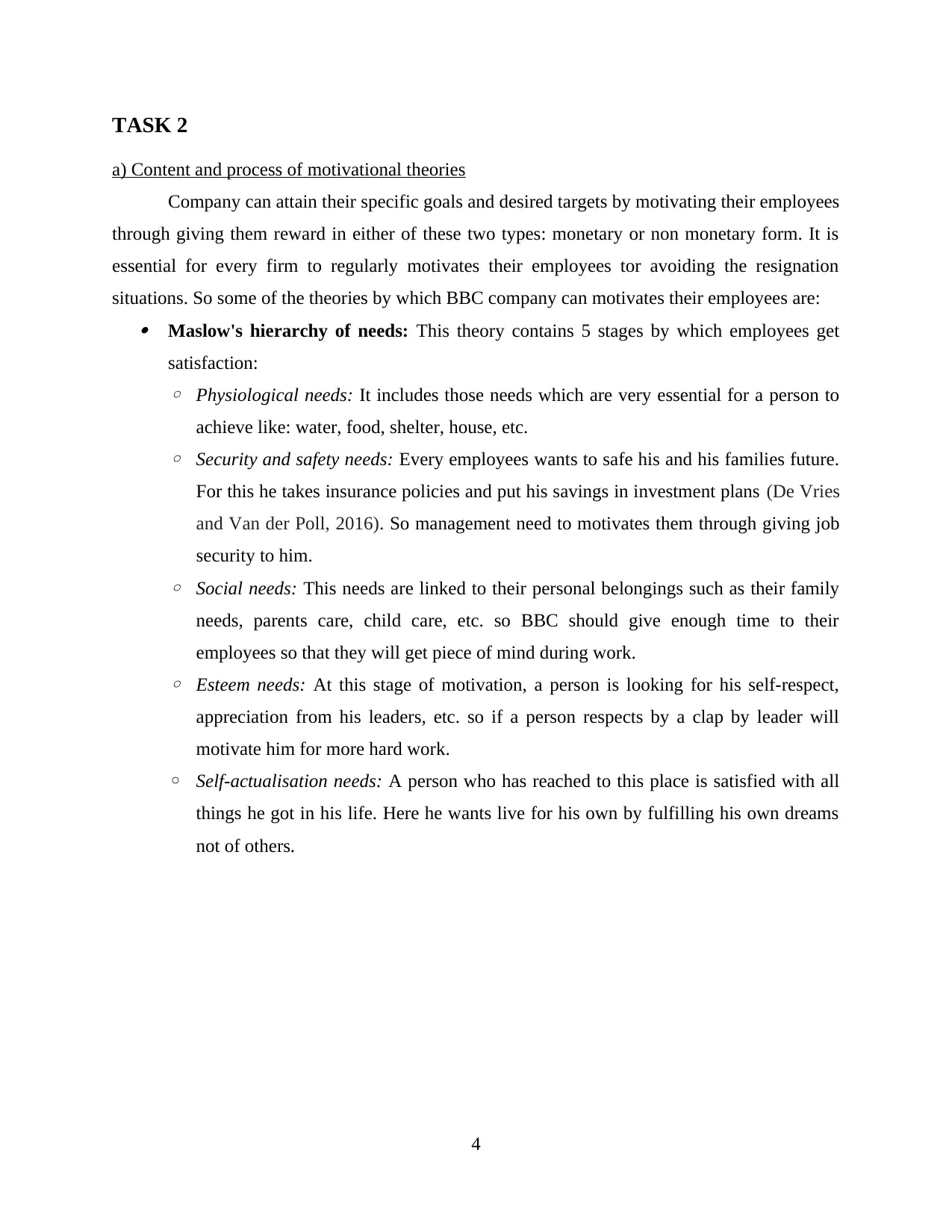
TASK 2
a) Content and process of motivational theories
Company can attain their specific goals and desired targets by motivating their employees
through giving them reward in either of these two types: monetary or non monetary form. It is
essential for every firm to regularly motivates their employees tor avoiding the resignation
situations. So some of the theories by which BBC company can motivates their employees are: Maslow's hierarchy of needs: This theory contains 5 stages by which employees get
satisfaction:
◦ Physiological needs: It includes those needs which are very essential for a person to
achieve like: water, food, shelter, house, etc.
◦ Security and safety needs: Every employees wants to safe his and his families future.
For this he takes insurance policies and put his savings in investment plans (De Vries
and Van der Poll, 2016). So management need to motivates them through giving job
security to him.
◦ Social needs: This needs are linked to their personal belongings such as their family
needs, parents care, child care, etc. so BBC should give enough time to their
employees so that they will get piece of mind during work.
◦ Esteem needs: At this stage of motivation, a person is looking for his self-respect,
appreciation from his leaders, etc. so if a person respects by a clap by leader will
motivate him for more hard work.
◦ Self-actualisation needs: A person who has reached to this place is satisfied with all
things he got in his life. Here he wants live for his own by fulfilling his own dreams
not of others.
4
a) Content and process of motivational theories
Company can attain their specific goals and desired targets by motivating their employees
through giving them reward in either of these two types: monetary or non monetary form. It is
essential for every firm to regularly motivates their employees tor avoiding the resignation
situations. So some of the theories by which BBC company can motivates their employees are: Maslow's hierarchy of needs: This theory contains 5 stages by which employees get
satisfaction:
◦ Physiological needs: It includes those needs which are very essential for a person to
achieve like: water, food, shelter, house, etc.
◦ Security and safety needs: Every employees wants to safe his and his families future.
For this he takes insurance policies and put his savings in investment plans (De Vries
and Van der Poll, 2016). So management need to motivates them through giving job
security to him.
◦ Social needs: This needs are linked to their personal belongings such as their family
needs, parents care, child care, etc. so BBC should give enough time to their
employees so that they will get piece of mind during work.
◦ Esteem needs: At this stage of motivation, a person is looking for his self-respect,
appreciation from his leaders, etc. so if a person respects by a clap by leader will
motivate him for more hard work.
◦ Self-actualisation needs: A person who has reached to this place is satisfied with all
things he got in his life. Here he wants live for his own by fulfilling his own dreams
not of others.
4
⊘ This is a preview!⊘
Do you want full access?
Subscribe today to unlock all pages.

Trusted by 1+ million students worldwide
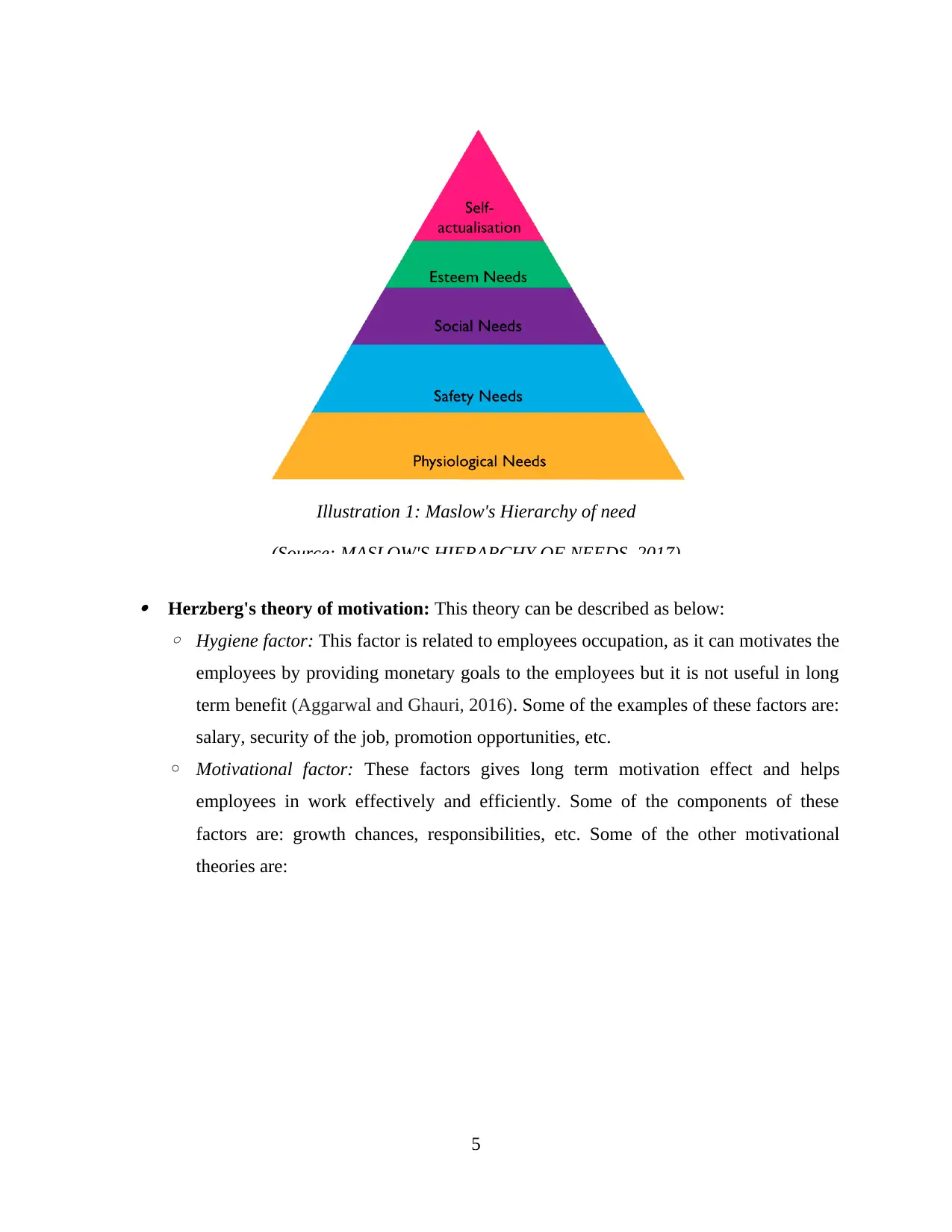
Herzberg's theory of motivation: This theory can be described as below:
◦ Hygiene factor: This factor is related to employees occupation, as it can motivates the
employees by providing monetary goals to the employees but it is not useful in long
term benefit (Aggarwal and Ghauri, 2016). Some of the examples of these factors are:
salary, security of the job, promotion opportunities, etc.
◦ Motivational factor: These factors gives long term motivation effect and helps
employees in work effectively and efficiently. Some of the components of these
factors are: growth chances, responsibilities, etc. Some of the other motivational
theories are:
5
Illustration 1: Maslow's Hierarchy of need
(Source: MASLOW'S HIERARCHY OF NEEDS, 2017)
◦ Hygiene factor: This factor is related to employees occupation, as it can motivates the
employees by providing monetary goals to the employees but it is not useful in long
term benefit (Aggarwal and Ghauri, 2016). Some of the examples of these factors are:
salary, security of the job, promotion opportunities, etc.
◦ Motivational factor: These factors gives long term motivation effect and helps
employees in work effectively and efficiently. Some of the components of these
factors are: growth chances, responsibilities, etc. Some of the other motivational
theories are:
5
Illustration 1: Maslow's Hierarchy of need
(Source: MASLOW'S HIERARCHY OF NEEDS, 2017)
Paraphrase This Document
Need a fresh take? Get an instant paraphrase of this document with our AI Paraphraser
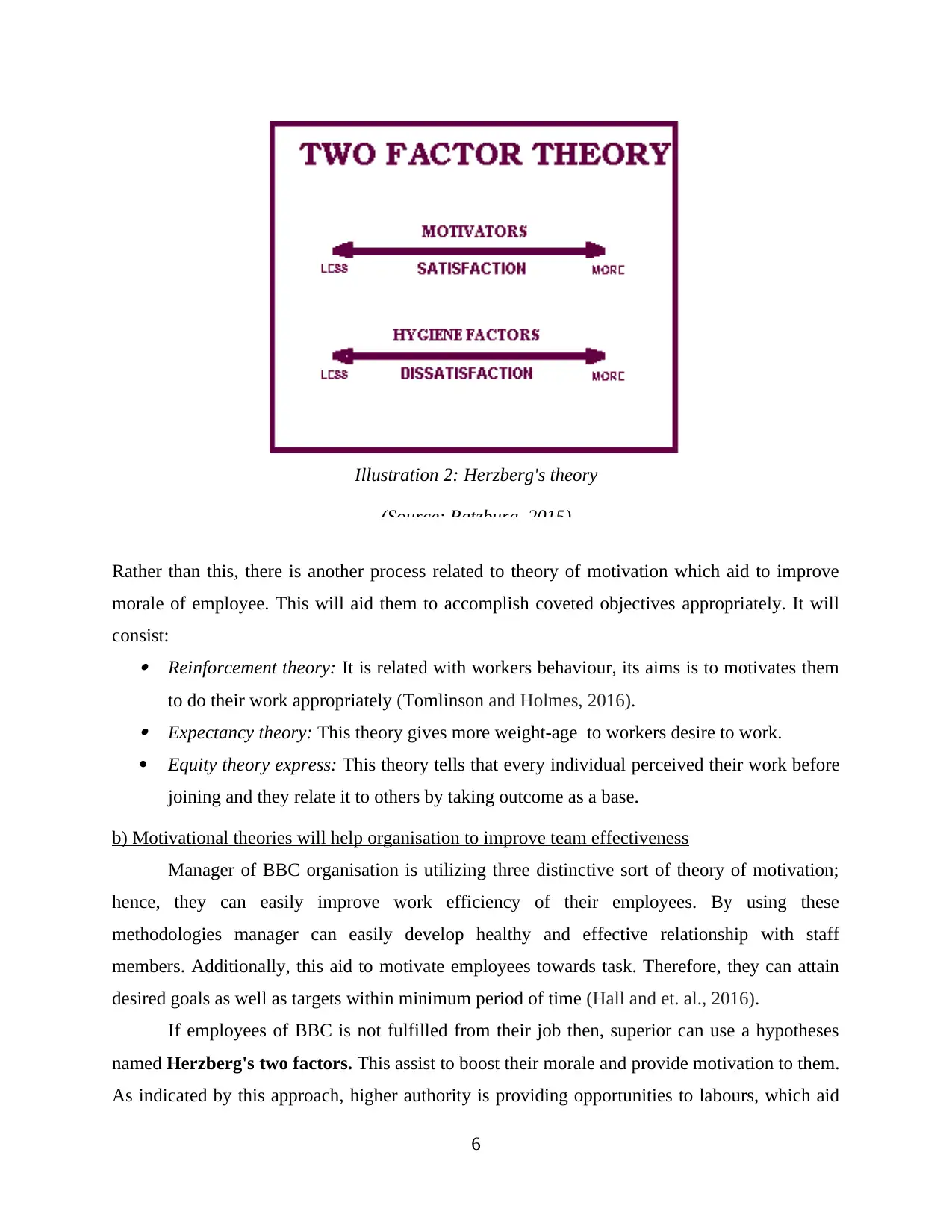
Rather than this, there is another process related to theory of motivation which aid to improve
morale of employee. This will aid them to accomplish coveted objectives appropriately. It will
consist: Reinforcement theory: It is related with workers behaviour, its aims is to motivates them
to do their work appropriately (Tomlinson and Holmes, 2016). Expectancy theory: This theory gives more weight-age to workers desire to work.
Equity theory express: This theory tells that every individual perceived their work before
joining and they relate it to others by taking outcome as a base.
b) Motivational theories will help organisation to improve team effectiveness
Manager of BBC organisation is utilizing three distinctive sort of theory of motivation;
hence, they can easily improve work efficiency of their employees. By using these
methodologies manager can easily develop healthy and effective relationship with staff
members. Additionally, this aid to motivate employees towards task. Therefore, they can attain
desired goals as well as targets within minimum period of time (Hall and et. al., 2016).
If employees of BBC is not fulfilled from their job then, superior can use a hypotheses
named Herzberg's two factors. This assist to boost their morale and provide motivation to them.
As indicated by this approach, higher authority is providing opportunities to labours, which aid
6
Illustration 2: Herzberg's theory
(Source: Ratzburg, 2015)
morale of employee. This will aid them to accomplish coveted objectives appropriately. It will
consist: Reinforcement theory: It is related with workers behaviour, its aims is to motivates them
to do their work appropriately (Tomlinson and Holmes, 2016). Expectancy theory: This theory gives more weight-age to workers desire to work.
Equity theory express: This theory tells that every individual perceived their work before
joining and they relate it to others by taking outcome as a base.
b) Motivational theories will help organisation to improve team effectiveness
Manager of BBC organisation is utilizing three distinctive sort of theory of motivation;
hence, they can easily improve work efficiency of their employees. By using these
methodologies manager can easily develop healthy and effective relationship with staff
members. Additionally, this aid to motivate employees towards task. Therefore, they can attain
desired goals as well as targets within minimum period of time (Hall and et. al., 2016).
If employees of BBC is not fulfilled from their job then, superior can use a hypotheses
named Herzberg's two factors. This assist to boost their morale and provide motivation to them.
As indicated by this approach, higher authority is providing opportunities to labours, which aid
6
Illustration 2: Herzberg's theory
(Source: Ratzburg, 2015)
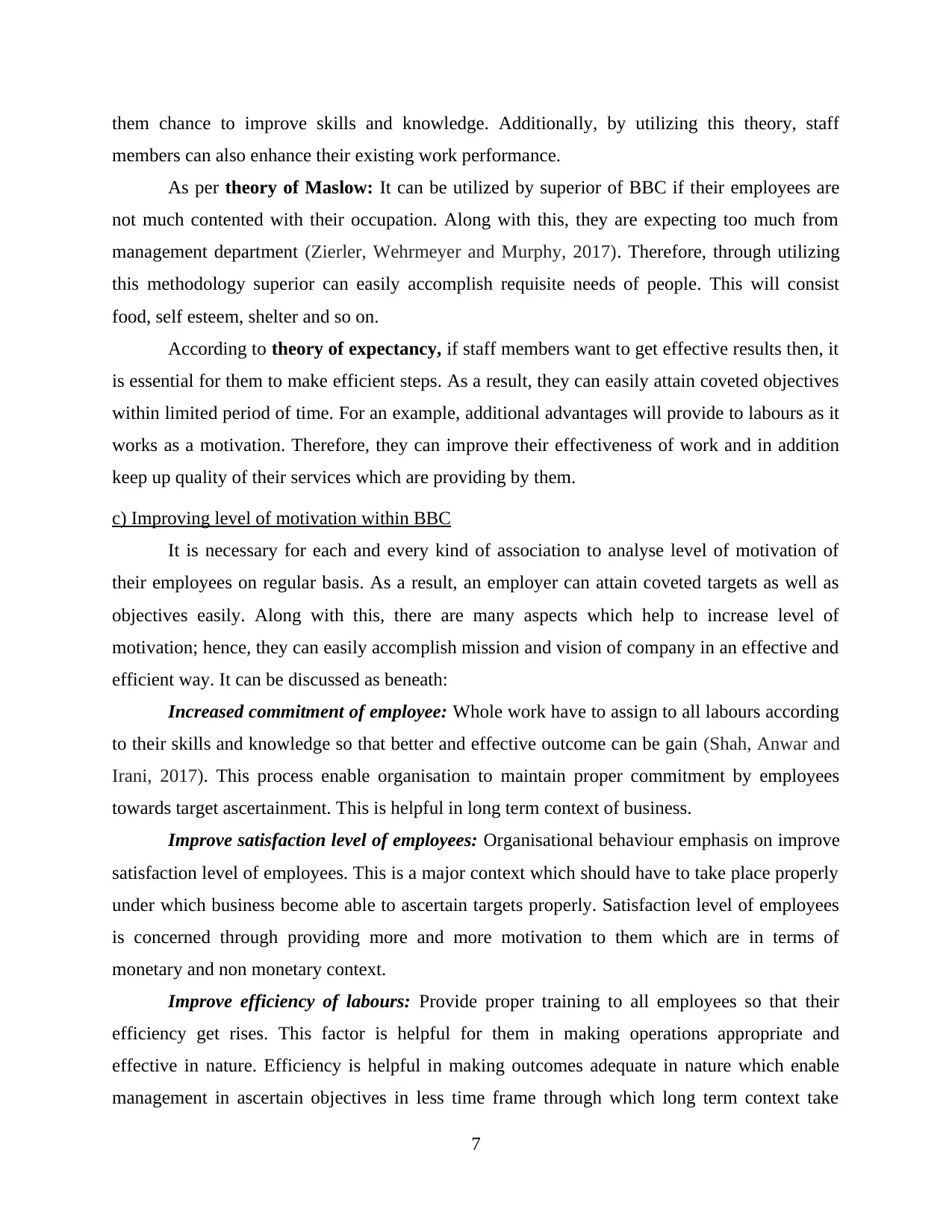
them chance to improve skills and knowledge. Additionally, by utilizing this theory, staff
members can also enhance their existing work performance.
As per theory of Maslow: It can be utilized by superior of BBC if their employees are
not much contented with their occupation. Along with this, they are expecting too much from
management department (Zierler, Wehrmeyer and Murphy, 2017). Therefore, through utilizing
this methodology superior can easily accomplish requisite needs of people. This will consist
food, self esteem, shelter and so on.
According to theory of expectancy, if staff members want to get effective results then, it
is essential for them to make efficient steps. As a result, they can easily attain coveted objectives
within limited period of time. For an example, additional advantages will provide to labours as it
works as a motivation. Therefore, they can improve their effectiveness of work and in addition
keep up quality of their services which are providing by them.
c) Improving level of motivation within BBC
It is necessary for each and every kind of association to analyse level of motivation of
their employees on regular basis. As a result, an employer can attain coveted targets as well as
objectives easily. Along with this, there are many aspects which help to increase level of
motivation; hence, they can easily accomplish mission and vision of company in an effective and
efficient way. It can be discussed as beneath:
Increased commitment of employee: Whole work have to assign to all labours according
to their skills and knowledge so that better and effective outcome can be gain (Shah, Anwar and
Irani, 2017). This process enable organisation to maintain proper commitment by employees
towards target ascertainment. This is helpful in long term context of business.
Improve satisfaction level of employees: Organisational behaviour emphasis on improve
satisfaction level of employees. This is a major context which should have to take place properly
under which business become able to ascertain targets properly. Satisfaction level of employees
is concerned through providing more and more motivation to them which are in terms of
monetary and non monetary context.
Improve efficiency of labours: Provide proper training to all employees so that their
efficiency get rises. This factor is helpful for them in making operations appropriate and
effective in nature. Efficiency is helpful in making outcomes adequate in nature which enable
management in ascertain objectives in less time frame through which long term context take
7
members can also enhance their existing work performance.
As per theory of Maslow: It can be utilized by superior of BBC if their employees are
not much contented with their occupation. Along with this, they are expecting too much from
management department (Zierler, Wehrmeyer and Murphy, 2017). Therefore, through utilizing
this methodology superior can easily accomplish requisite needs of people. This will consist
food, self esteem, shelter and so on.
According to theory of expectancy, if staff members want to get effective results then, it
is essential for them to make efficient steps. As a result, they can easily attain coveted objectives
within limited period of time. For an example, additional advantages will provide to labours as it
works as a motivation. Therefore, they can improve their effectiveness of work and in addition
keep up quality of their services which are providing by them.
c) Improving level of motivation within BBC
It is necessary for each and every kind of association to analyse level of motivation of
their employees on regular basis. As a result, an employer can attain coveted targets as well as
objectives easily. Along with this, there are many aspects which help to increase level of
motivation; hence, they can easily accomplish mission and vision of company in an effective and
efficient way. It can be discussed as beneath:
Increased commitment of employee: Whole work have to assign to all labours according
to their skills and knowledge so that better and effective outcome can be gain (Shah, Anwar and
Irani, 2017). This process enable organisation to maintain proper commitment by employees
towards target ascertainment. This is helpful in long term context of business.
Improve satisfaction level of employees: Organisational behaviour emphasis on improve
satisfaction level of employees. This is a major context which should have to take place properly
under which business become able to ascertain targets properly. Satisfaction level of employees
is concerned through providing more and more motivation to them which are in terms of
monetary and non monetary context.
Improve efficiency of labours: Provide proper training to all employees so that their
efficiency get rises. This factor is helpful for them in making operations appropriate and
effective in nature. Efficiency is helpful in making outcomes adequate in nature which enable
management in ascertain objectives in less time frame through which long term context take
7
⊘ This is a preview!⊘
Do you want full access?
Subscribe today to unlock all pages.

Trusted by 1+ million students worldwide
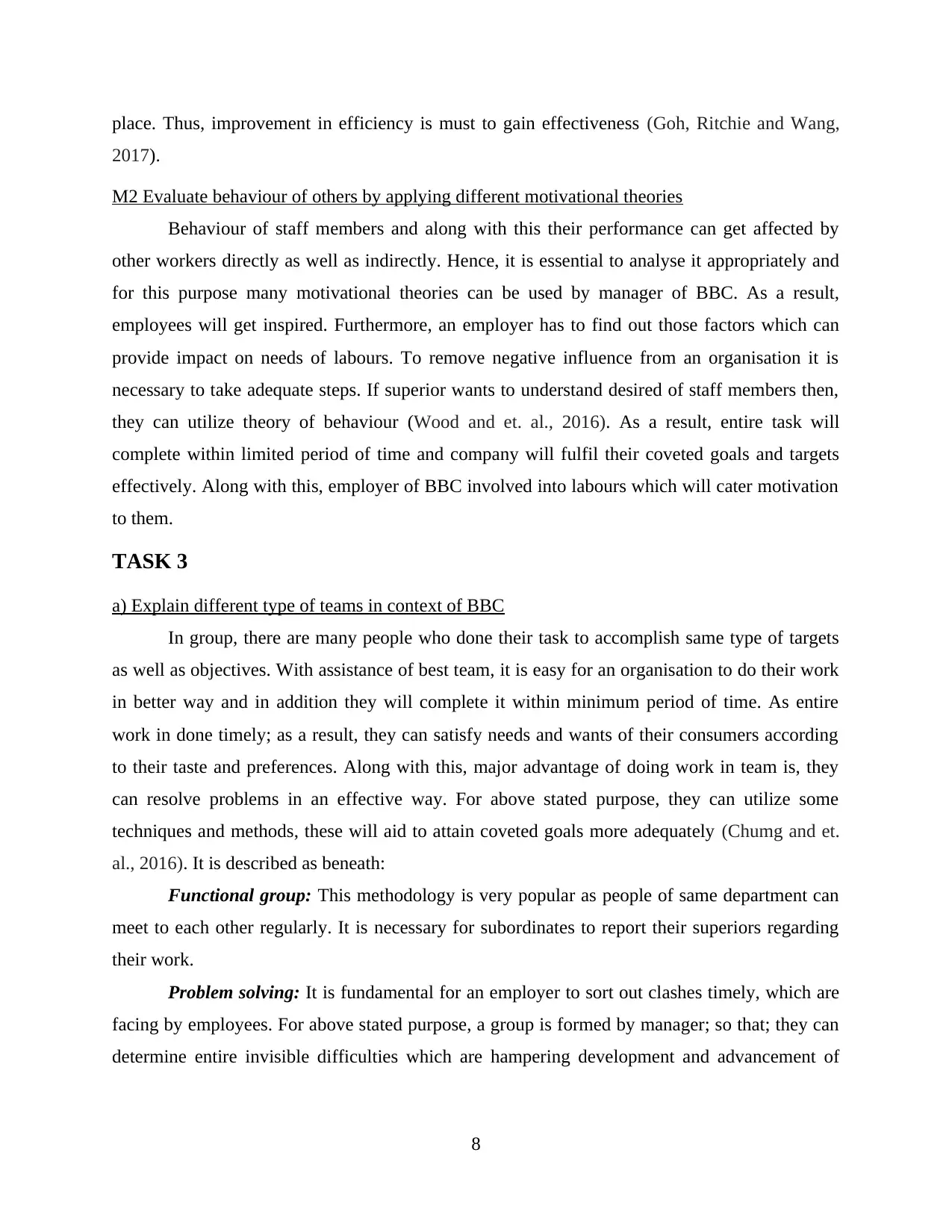
place. Thus, improvement in efficiency is must to gain effectiveness (Goh, Ritchie and Wang,
2017).
M2 Evaluate behaviour of others by applying different motivational theories
Behaviour of staff members and along with this their performance can get affected by
other workers directly as well as indirectly. Hence, it is essential to analyse it appropriately and
for this purpose many motivational theories can be used by manager of BBC. As a result,
employees will get inspired. Furthermore, an employer has to find out those factors which can
provide impact on needs of labours. To remove negative influence from an organisation it is
necessary to take adequate steps. If superior wants to understand desired of staff members then,
they can utilize theory of behaviour (Wood and et. al., 2016). As a result, entire task will
complete within limited period of time and company will fulfil their coveted goals and targets
effectively. Along with this, employer of BBC involved into labours which will cater motivation
to them.
TASK 3
a) Explain different type of teams in context of BBC
In group, there are many people who done their task to accomplish same type of targets
as well as objectives. With assistance of best team, it is easy for an organisation to do their work
in better way and in addition they will complete it within minimum period of time. As entire
work in done timely; as a result, they can satisfy needs and wants of their consumers according
to their taste and preferences. Along with this, major advantage of doing work in team is, they
can resolve problems in an effective way. For above stated purpose, they can utilize some
techniques and methods, these will aid to attain coveted goals more adequately (Chumg and et.
al., 2016). It is described as beneath:
Functional group: This methodology is very popular as people of same department can
meet to each other regularly. It is necessary for subordinates to report their superiors regarding
their work.
Problem solving: It is fundamental for an employer to sort out clashes timely, which are
facing by employees. For above stated purpose, a group is formed by manager; so that; they can
determine entire invisible difficulties which are hampering development and advancement of
8
2017).
M2 Evaluate behaviour of others by applying different motivational theories
Behaviour of staff members and along with this their performance can get affected by
other workers directly as well as indirectly. Hence, it is essential to analyse it appropriately and
for this purpose many motivational theories can be used by manager of BBC. As a result,
employees will get inspired. Furthermore, an employer has to find out those factors which can
provide impact on needs of labours. To remove negative influence from an organisation it is
necessary to take adequate steps. If superior wants to understand desired of staff members then,
they can utilize theory of behaviour (Wood and et. al., 2016). As a result, entire task will
complete within limited period of time and company will fulfil their coveted goals and targets
effectively. Along with this, employer of BBC involved into labours which will cater motivation
to them.
TASK 3
a) Explain different type of teams in context of BBC
In group, there are many people who done their task to accomplish same type of targets
as well as objectives. With assistance of best team, it is easy for an organisation to do their work
in better way and in addition they will complete it within minimum period of time. As entire
work in done timely; as a result, they can satisfy needs and wants of their consumers according
to their taste and preferences. Along with this, major advantage of doing work in team is, they
can resolve problems in an effective way. For above stated purpose, they can utilize some
techniques and methods, these will aid to attain coveted goals more adequately (Chumg and et.
al., 2016). It is described as beneath:
Functional group: This methodology is very popular as people of same department can
meet to each other regularly. It is necessary for subordinates to report their superiors regarding
their work.
Problem solving: It is fundamental for an employer to sort out clashes timely, which are
facing by employees. For above stated purpose, a group is formed by manager; so that; they can
determine entire invisible difficulties which are hampering development and advancement of
8
Paraphrase This Document
Need a fresh take? Get an instant paraphrase of this document with our AI Paraphraser
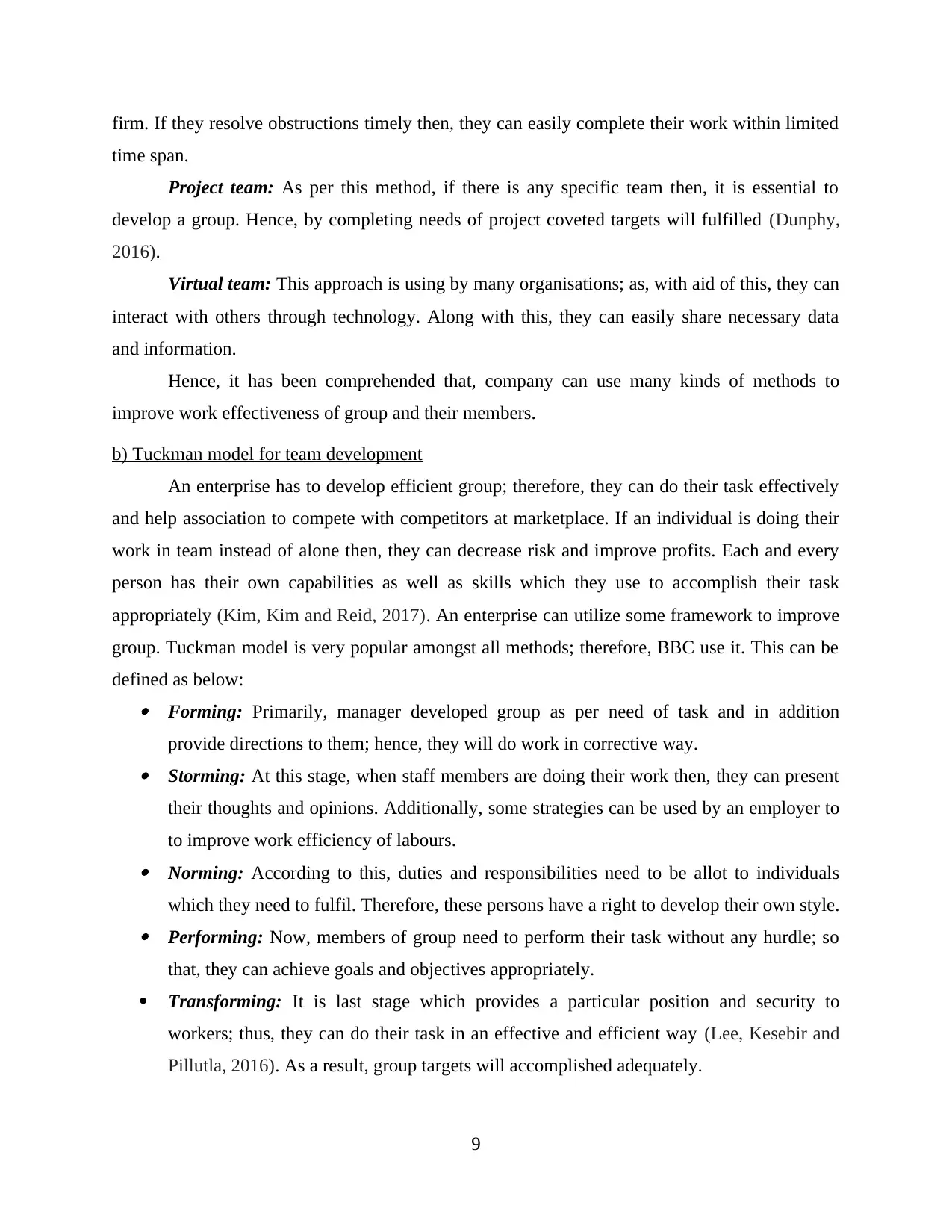
firm. If they resolve obstructions timely then, they can easily complete their work within limited
time span.
Project team: As per this method, if there is any specific team then, it is essential to
develop a group. Hence, by completing needs of project coveted targets will fulfilled (Dunphy,
2016).
Virtual team: This approach is using by many organisations; as, with aid of this, they can
interact with others through technology. Along with this, they can easily share necessary data
and information.
Hence, it has been comprehended that, company can use many kinds of methods to
improve work effectiveness of group and their members.
b) Tuckman model for team development
An enterprise has to develop efficient group; therefore, they can do their task effectively
and help association to compete with competitors at marketplace. If an individual is doing their
work in team instead of alone then, they can decrease risk and improve profits. Each and every
person has their own capabilities as well as skills which they use to accomplish their task
appropriately (Kim, Kim and Reid, 2017). An enterprise can utilize some framework to improve
group. Tuckman model is very popular amongst all methods; therefore, BBC use it. This can be
defined as below: Forming: Primarily, manager developed group as per need of task and in addition
provide directions to them; hence, they will do work in corrective way. Storming: At this stage, when staff members are doing their work then, they can present
their thoughts and opinions. Additionally, some strategies can be used by an employer to
to improve work efficiency of labours. Norming: According to this, duties and responsibilities need to be allot to individuals
which they need to fulfil. Therefore, these persons have a right to develop their own style. Performing: Now, members of group need to perform their task without any hurdle; so
that, they can achieve goals and objectives appropriately.
Transforming: It is last stage which provides a particular position and security to
workers; thus, they can do their task in an effective and efficient way (Lee, Kesebir and
Pillutla, 2016). As a result, group targets will accomplished adequately.
9
time span.
Project team: As per this method, if there is any specific team then, it is essential to
develop a group. Hence, by completing needs of project coveted targets will fulfilled (Dunphy,
2016).
Virtual team: This approach is using by many organisations; as, with aid of this, they can
interact with others through technology. Along with this, they can easily share necessary data
and information.
Hence, it has been comprehended that, company can use many kinds of methods to
improve work effectiveness of group and their members.
b) Tuckman model for team development
An enterprise has to develop efficient group; therefore, they can do their task effectively
and help association to compete with competitors at marketplace. If an individual is doing their
work in team instead of alone then, they can decrease risk and improve profits. Each and every
person has their own capabilities as well as skills which they use to accomplish their task
appropriately (Kim, Kim and Reid, 2017). An enterprise can utilize some framework to improve
group. Tuckman model is very popular amongst all methods; therefore, BBC use it. This can be
defined as below: Forming: Primarily, manager developed group as per need of task and in addition
provide directions to them; hence, they will do work in corrective way. Storming: At this stage, when staff members are doing their work then, they can present
their thoughts and opinions. Additionally, some strategies can be used by an employer to
to improve work efficiency of labours. Norming: According to this, duties and responsibilities need to be allot to individuals
which they need to fulfil. Therefore, these persons have a right to develop their own style. Performing: Now, members of group need to perform their task without any hurdle; so
that, they can achieve goals and objectives appropriately.
Transforming: It is last stage which provides a particular position and security to
workers; thus, they can do their task in an effective and efficient way (Lee, Kesebir and
Pillutla, 2016). As a result, group targets will accomplished adequately.
9
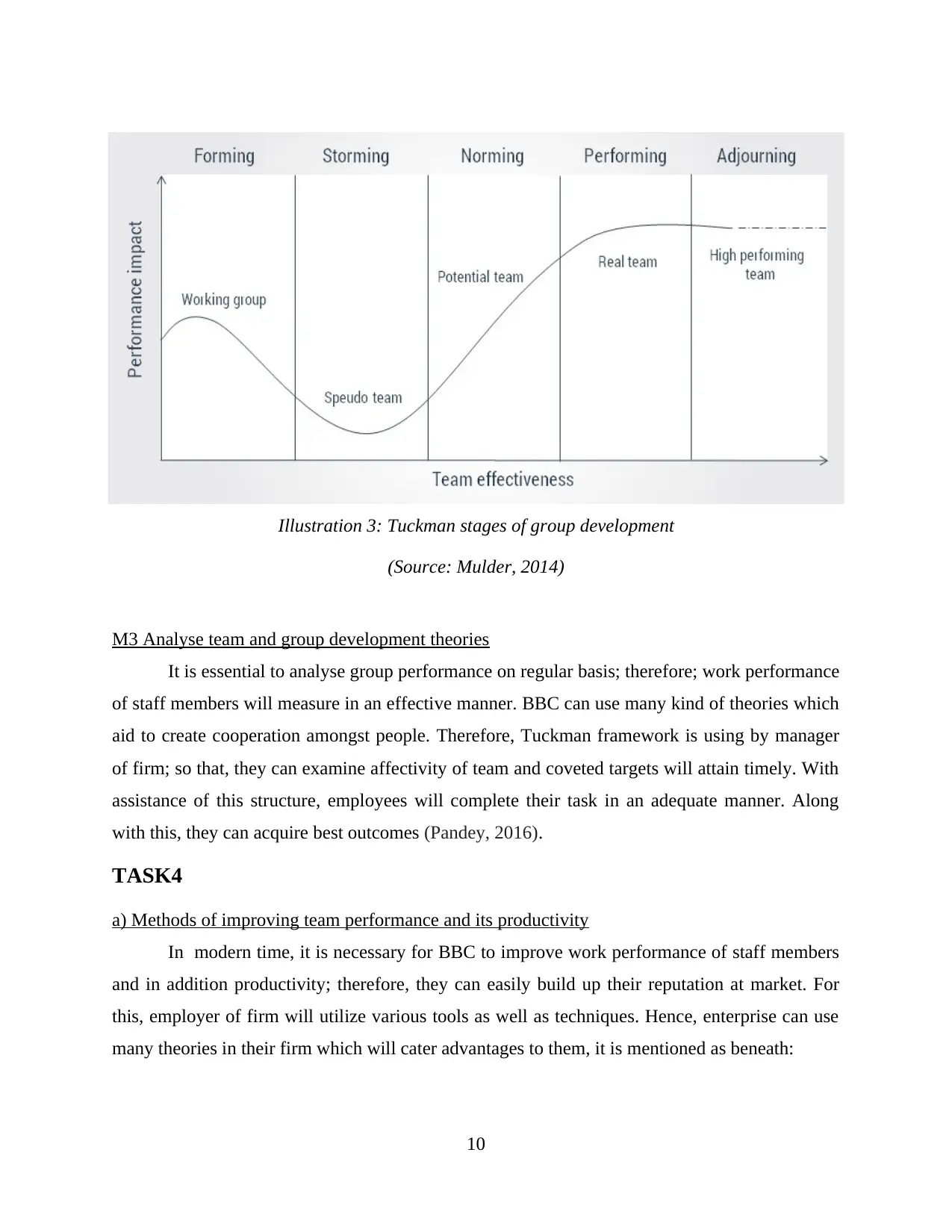
M3 Analyse team and group development theories
It is essential to analyse group performance on regular basis; therefore; work performance
of staff members will measure in an effective manner. BBC can use many kind of theories which
aid to create cooperation amongst people. Therefore, Tuckman framework is using by manager
of firm; so that, they can examine affectivity of team and coveted targets will attain timely. With
assistance of this structure, employees will complete their task in an adequate manner. Along
with this, they can acquire best outcomes (Pandey, 2016).
TASK4
a) Methods of improving team performance and its productivity
In modern time, it is necessary for BBC to improve work performance of staff members
and in addition productivity; therefore, they can easily build up their reputation at market. For
this, employer of firm will utilize various tools as well as techniques. Hence, enterprise can use
many theories in their firm which will cater advantages to them, it is mentioned as beneath:
10
Illustration 3: Tuckman stages of group development
(Source: Mulder, 2014)
It is essential to analyse group performance on regular basis; therefore; work performance
of staff members will measure in an effective manner. BBC can use many kind of theories which
aid to create cooperation amongst people. Therefore, Tuckman framework is using by manager
of firm; so that, they can examine affectivity of team and coveted targets will attain timely. With
assistance of this structure, employees will complete their task in an adequate manner. Along
with this, they can acquire best outcomes (Pandey, 2016).
TASK4
a) Methods of improving team performance and its productivity
In modern time, it is necessary for BBC to improve work performance of staff members
and in addition productivity; therefore, they can easily build up their reputation at market. For
this, employer of firm will utilize various tools as well as techniques. Hence, enterprise can use
many theories in their firm which will cater advantages to them, it is mentioned as beneath:
10
Illustration 3: Tuckman stages of group development
(Source: Mulder, 2014)
⊘ This is a preview!⊘
Do you want full access?
Subscribe today to unlock all pages.

Trusted by 1+ million students worldwide
1 out of 16
Related Documents
Your All-in-One AI-Powered Toolkit for Academic Success.
+13062052269
info@desklib.com
Available 24*7 on WhatsApp / Email
![[object Object]](/_next/static/media/star-bottom.7253800d.svg)
Unlock your academic potential
Copyright © 2020–2025 A2Z Services. All Rights Reserved. Developed and managed by ZUCOL.





